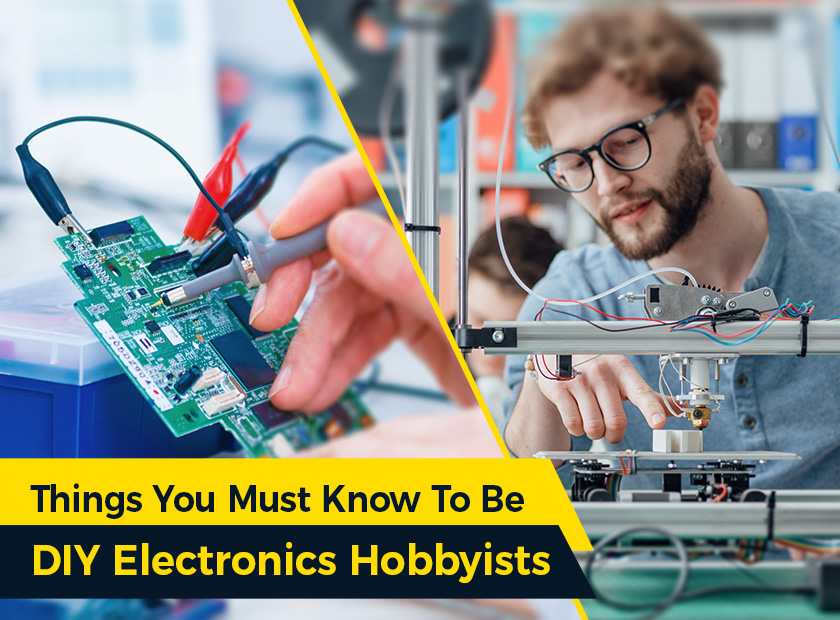Things You Must Know To Be DIY Electronics Hobbyists

DIY electronics is a rewarding and challenging hobby that allows you to create your own electronic devices, repair or modify existing ones, and learn about the inner workings of modern technology. It can also be a great way to save money by fixing broken electronics instead of buying new ones. In this blog, we'll introduce you to the world of DIY electronics and provide some tips to help you get started.
What Is DIY Electronics?
First, let's define what we mean by DIY electronics. In this context, we're referring to the practice of building electronic circuits from scratch using components such as resistors, capacitors, and transistors. This can range from simple projects like building a basic LED circuit to more complex projects such as building your own robot.
Things You Must Know To Be DIY Electronics Hobbyists
To get started with DIY electronics, you'll need some basic tools and supplies. These include a soldering iron, solder, wire cutters, pliers, and a multimeter. You'll also need a variety of electronic components, which you can purchase from electronics suppliers online or at a local electronics store.
When it comes to selecting your first project, start small and choose something that matches your skill level. There are many beginner-friendly projects available online, such as building a simple LED circuit or a basic power supply. As you gain experience, you can move on to more complex projects.
One great way to learn about DIY electronics is to participate in online communities or attend local meetups. These groups often hold workshops and events where you can learn from more experienced hobbyists and share your own projects with others. You can also find a wealth of information online, including tutorials, circuit diagrams, and forums where you can ask for help with your projects.
When building electronic circuits, it's important to take safety precautions. Always wear safety glasses when soldering, and make sure your work area is well-ventilated. Make sure to follow the manufacturer's instructions for any electronic components you're using, and be sure to use the correct voltage and amperage for your circuits.
In addition to being a fun and rewarding hobby, DIY electronics can also lead to a career in the field of electronics or engineering. Many professional engineers started out as hobbyists, and the skills and knowledge you gain from DIY electronics can be applied to a variety of careers in science and technology.
Do-it-yourself (DIY) electronics is an exciting and rewarding hobby that has been gaining popularity in recent years. It involves the creation of electronic projects from scratch, using various components and tools to build and design circuits. DIY electronics is not only a fun and engaging way to learn about electronics but can also be a valuable skill in the rapidly advancing technology industry. In this blog post, we will explore the world of DIY electronics and how to get started as a hobbyist.
Getting Started To Be DIY Electronics Hobbyists
One of the great things about DIY electronics is that it does not require a significant investment to get started. All you need is a basic understanding of electronics and access to some essential tools and components. You can start by researching online or joining online communities to learn about different projects, components, and techniques.
Essential Tools:
To get started, you will need some essential tools, including a soldering iron, wire cutters, pliers, and a multimeter. These tools will allow you to solder components, cut wires, and test circuits. It is essential to invest in good-quality tools to ensure your projects are safe and reliable.
Components:
There are various components you will need to build circuits, including resistors, capacitors, diodes, transistors, and integrated circuits (ICs). You can purchase these components online or from local electronic stores. It is essential to research and understand the specifications and functions of each component to ensure you are using them correctly.
Projects:
DIY electronics projects can range from simple circuits to complex projects involving microcontrollers and programming. Some popular beginner projects include building a simple LED circuit, a basic audio amplifier, or a small robot. Online communities and forums are great resources for finding project ideas, sharing your projects, and getting feedback from other hobbyists.
Safety:
When working with electronics, safety should always be a top priority. It is important to wear safety goggles, avoid working on live circuits, and follow safety guidelines when using tools and components.
In conclusion, DIY electronics is a great hobby for anyone who is interested in technology and enjoys hands-on projects. With some basic tools and supplies, you can get started building your own electronic circuits and learning about the inner workings of modern technology. Start small, participate in online communities, and always take safety precautions when building circuits. Who knows, you might even find yourself with a new career path in the exciting field of electronics!
DIY Electronics Hobbyists and Elecrow
Elecrow is a one-stop solution provider for DIY Electronics Hobbyists, If you have DIY Electronics projects in your mind, Elecrow can help you turn them into reality, with Elecrow services like PCB manufacturing, PCB Assembly, Online 3D Printing service and Laser cutting service, you can also share your projects in Elecrow forum to get more attention. And more, Elecrow has a Partner seller program that provides DIY Electronics Hobbyists a chance to sell their DIY Electronics on Elecrow.com in an easy way.
